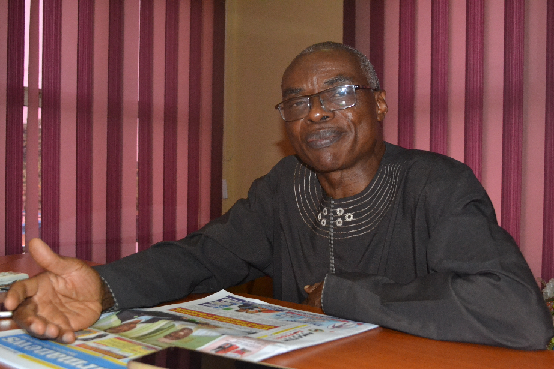In this recent interview with Pharmanews, Managing Director of Oak-Faith Pharmaceutical Resources Ltd, Pharm. Chris Ojeabulu, voices the yearnings of most indigenous pharmaceutical manufacturers in the country, calling on the government to improve on patronage of local products and formulation of friendly policies. Excerpts:

Congratulations on the successful completion of your new factory. How long did this project take and what was the estimated cost?
Given what our vision is as a pharmaceutical manufacturing company, it took us a number of years to put the structure in place. Going by the heavy cost of doing pharmaceutical manufacturing in the country, we decided to take the bull by the horn, on our own, not waiting for NAFDAC to tell us what to do.
We took the giant stride to put our factory in the right position. We took the decision voluntarily because of our vision, and it took us quite a number of years to get here, because of the facilities we have in place. All facilities are custom-built, to meet the current GMP requirements. It was quite expensive and you know the cost of materials these days; it is quite high.
We didn’t go to industrial banks; we went to commercial banks and you know the rates are high. But, by the grace of God, we are through and we do not have anything outstanding.
Are there any challenges you are facing in this new site?
First, government coming to the aid of individuals in this country is quite unheard of and is a very tall order. However, the bigger challenge now is power. Power is very critical because, right now, we are running on generator for 24 hours. Rates are high and the roads are bad. You can’t move products from one place to the other without any form of damage. The vehicles don’t last and you spend a lot of money on maintenance. And all these have a chain effect on the cost.
The other major problem we have is that government is not patronising the industry. If the government should patronise the industry directly, I am sure the pharmaceutical industry will experience rapid growth. In fact, a lot of manufactures will go into dosage forms, which are currently not produced here. But government patronage is not working here; there is no direct government patronage like what we have in other countries. Over there, before the products are rolled out or delivered, you know the government will pay you. But here that is not the case and it is not so encouraging to local manufacturers.
The pharma industry is a highly regulated one. You don’t just do what you want. There are standards to be kept, standards to be met, and that is money in every sense of the word. So, if the government wants local manufacturers to grow, they should stop importing. And you know drug itself is a security issue. If anything happens and you are caught, then you are gone. So, the government should come in and consider this because stakeholders have been talking about drugs being a security issue but the way the government is handling it is not the way it should be. We are hoping that, over time, the government will look into it and do the right thing. Patronage is important to sustain the industry.
As one of the few local pharma manufacturers in the country, tell us how the experience has been so far in terms of government policies and business survival?
Our government has policy summersault; they bring out a policy, saying “these are the products on prohibition list” and then, behind the scenes, you will see those products coming in again. People are bringing them from outside the country, and those policies are broken.
This is usually a big challenge because local companies which deal in those products line would have acquired machines and raw materials for production before the announcement of the policy. Thus, when you see people importing same products and selling at cheaper rates, you will realise that your investments are stuck.
Bringing in raw materials and equipment throught the ports is very difficult, the dues and levies and whatever you pay are not encouraging. The inconsistency in government policies is not helping in that area as well. So, these are some of the inconsistencies that make the business swing up and down and it’s like the growth you expect, you don’t get it.
How can these problems be solved?
I think the way forward is for the government to start thinking of exporting pharma products because any country that does not export is not growing. I believe that if the government can focus on the petrochemical industry here, some of the raw materials that we are bringing in could be sourced locally; yet we have such a petrochemical industry not being developed, even though it is a big source of raw materials for the pharma industry.
It is imperative that this is urgently considered, because if anything happens and you can’t do foreign exchange, it will be quite difficult for us to continue in business. This explains why the whole thing is going round the same circle as Nigeria only depends on crude oil for foreign exchange.
Government should focus on manufacturing. It is incumbent on those in authority to encourage indigenous manufacturers by providing the necessary facilities and putting infrastructure in place. Presently, the roads are not there for distribution, the interest rates are so high that you cannot access anything, and even before you get them it takes a lot.
Again government patronage is key. Government should patronise the industry to encourage local manufacturers. Interest rates are high, tariffs are high, multiple taxations are there – when you move from one state to another you have to pay various taxes on the road. Even with all the documents, they will still tell you “it is not applicable here” and you have to pay additional money.
For example, when you are going from Lagos State to Warri, officers on the highway will tell you that you have to pay a different rate. There are federal institutions controlling this but the point is that in order for some of the state governments to create jobs for those who helped them to win elections, they create some additional taxes to satisfy these people. You have to buy their stickers for your vehicle, apart from the federal stickers that you buy – which are supposed to cover your vehicles nationwide – but they have seen it as an extra means of generating revenue that will kill peoples’ businesses. We will continue to appeal to the government to look into this. It requires continuous advocacy and lobbying.
What does the relocation of the company to its new site portend for the company and its products?
Well, it is going to increase capacity utilisation, and the quality and quantity of our products will be higher. Based on what we have on ground, there are facilities to ensure that the quality being produced is expanded, and then we intend to add more products.
Generally the capacity utilisation of facilities in this clime is quite low and there are so many things to contend with. We are expecting that with the bigger facilities on ground, we are going to have a wider coverage in our distribution network and patients will be able to enjoy access to their medicines in good time. We now have bigger equipment and compared to where we were before, 95 per cent of the machines we have here now are bigger and newly imported.
How long have you been here and what is your vision for expansion?
We have been here for about two years now, and our vision is to expand our products nationwide.










